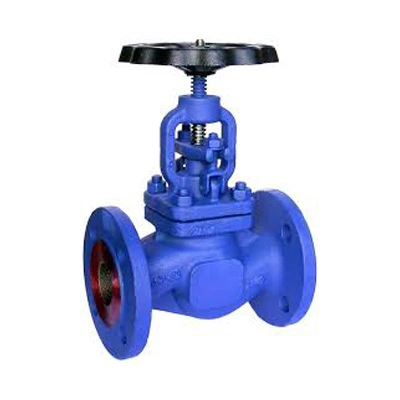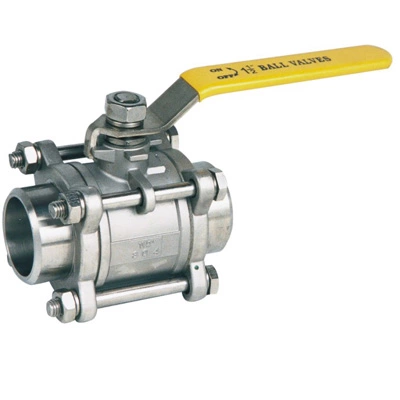The Differences Between Ball Valves and Globe Valves
Valves are used to control the flow of gases, liquids and granular solids. They come in many types, sizes, materials, pressures and temperature ratings, and means of actuation. Globe valves and ball valves are two members of the valve family, and the following introduces the difference between ball valves and globe valves.
The globe valve belongs to the forced seal valve type, the valve stem opening and closing stroke is relatively short, and has the very reliable cutting-off movement, which makes this kind of valve ideal for use as a medium for shutting-off, adjustment and throttling. When the valve is closed, pressure must be applied to the disc to prevent leakage of the sealing surface. When the medium from the lower part of the disc into the valve, the resistance that the operating force needs to overcome is the propulsive force generated by the friction between the stem and packing and the pressure from the medium. The force of closing the valve is greater than the force of opening the valve, so the diameter of the stem should be large, otherwise the valve stem may be bent. Once the disc of the globe valve is in the open state, there is no longer contact between the seat and the sealing surface, so the globe valve has a good seal performance. The globe valve has a simple structure, convenient manufacture and maintenance, small working stroke, short opening and closing time, good sealing performance, and long service life. However, its fluid resistance, the force of opening and closing are large, and the adjustment performance is poor. It is not suitable for media with particles or high viscosity.

A ball valve is mainly used in the pipeline to cut, distribute and change the flow direction of the medium. Ball valves with small fluid resistance, simple structure, small size and lightweight, are widely used in recent years. At present, the sealing surface material of the ball valve is widely used in plastic and has good sealing performance, and has been widely used in a vacuum system. The ball valve is easy to operate, and it can be opened and closed quickly. It can be rotated by 90° from full opening to full closing, which is convenient for long-distance control. The ball valve is easy to maintain because the sealing ring is generally movable, and it is convenient to disassemble and replace. When the ball valve is fully open or fully closed, the sealing surface of the ball and the valve seat is isolated from the medium, and the medium does not cause erosion of the sealing surface of the valve when the medium passes. Ball valves are available in a wide range of applications.

The above is the relevant content about the differences between globe valves and ball valves. These two kinds of valves are actually very common in our life, and we should have a certain knowledge about them.
The globe valve belongs to the forced seal valve type, the valve stem opening and closing stroke is relatively short, and has the very reliable cutting-off movement, which makes this kind of valve ideal for use as a medium for shutting-off, adjustment and throttling. When the valve is closed, pressure must be applied to the disc to prevent leakage of the sealing surface. When the medium from the lower part of the disc into the valve, the resistance that the operating force needs to overcome is the propulsive force generated by the friction between the stem and packing and the pressure from the medium. The force of closing the valve is greater than the force of opening the valve, so the diameter of the stem should be large, otherwise the valve stem may be bent. Once the disc of the globe valve is in the open state, there is no longer contact between the seat and the sealing surface, so the globe valve has a good seal performance. The globe valve has a simple structure, convenient manufacture and maintenance, small working stroke, short opening and closing time, good sealing performance, and long service life. However, its fluid resistance, the force of opening and closing are large, and the adjustment performance is poor. It is not suitable for media with particles or high viscosity.

A ball valve is mainly used in the pipeline to cut, distribute and change the flow direction of the medium. Ball valves with small fluid resistance, simple structure, small size and lightweight, are widely used in recent years. At present, the sealing surface material of the ball valve is widely used in plastic and has good sealing performance, and has been widely used in a vacuum system. The ball valve is easy to operate, and it can be opened and closed quickly. It can be rotated by 90° from full opening to full closing, which is convenient for long-distance control. The ball valve is easy to maintain because the sealing ring is generally movable, and it is convenient to disassemble and replace. When the ball valve is fully open or fully closed, the sealing surface of the ball and the valve seat is isolated from the medium, and the medium does not cause erosion of the sealing surface of the valve when the medium passes. Ball valves are available in a wide range of applications.

The above is the relevant content about the differences between globe valves and ball valves. These two kinds of valves are actually very common in our life, and we should have a certain knowledge about them.

